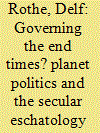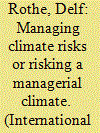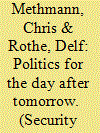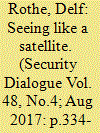|
|
|
Sort Order |
|
|
|
Items / Page
|
|
|
|
|
|
|
| Srl | Item |
| 1 |
ID:
172342


|
|
|
|
|
| Summary/Abstract |
This article furthers the debate on the political implications of the Anthropocene – the most recent geological epoch marked by catastrophic environmental change – by engaging it through the lens of political theology. The article starts from the observation that discourses on the Anthropocene and related political projects are deeply influenced by a linear temporality and a common orientation towards the threat of the end of time. It distinguishes three competing discourses of the Anthropocene, eco-catastrophism, eco-modernism and planetary realism. The article analyses how these discourses invoke and update key symbols, images, and storylines of Christian political theology. Furthermore, it studies how each discourse mobilises these secularised Christian motifs to promote competing planet political projects. Each of these projects develops a different position towards the unfolding planetary crisis and the related threat of the end of time. Eco-catastrophism calls for a planetary emergency management, eco-modernism promotes ongoing experimentation with the planet, whereas planetary realism translates into what could be called a ‘realpolitik of resilience’. Revealing the Western theological roots of the Anthropocene and planet politics is essential if the emerging literature on the Anthropocene wants to live up to its promise of pluralising and decolonising IR.
|
|
|
|
|
|
|
|
|
|
|
|
|
|
|
|
| 2 |
ID:
108059


|
|
|
|
|
| Publication |
2011.
|
| Summary/Abstract |
Current international climate governance from a risk-political perspective points to a paradoxical moment in world risk society. While the probability of negative climate impacts increases and we can see the emergence of a common risk perception among international decision-makers, nation states in the international climate regime fail to agree on effective preventive measures that could mitigate the harming effects of global warming. While at the discursive level climate change is constructed as one of the major risks in the twenty-first century, the focus in international climate governance remains on voluntary measures and market-based instruments. Drawing on discourse theory, this paradox can be explained as the outcome of a discursive struggle in climate politics. Risk, in this perspective, is a political technology to govern the future that is embedded within broader political rationalities. Until 2007, risk management in climate governance was established as a form of advanced liberal government based on individualisation and self-responsibility. The growing consensus on dangerous climate change ultimately reinforces this advanced liberal risk management by presenting climate change as a 'naturalised' de-bounded risk and blurring its socio-economic causes.
|
|
|
|
|
|
|
|
|
|
|
|
|
|
|
|
| 3 |
ID:
114594


|
|
|
|
|
| Publication |
2012.
|
| Summary/Abstract |
The recent global climate change discourse is a prominent example of a securitization of environmental issues. While the problem is often framed in the language of existentialism, crisis or even apocalypse, climate discourses rarely result in exceptional or extraordinary measures, but rather put forth a governmental scheme of piecemeal and technocratic solutions often associated with risk management. This article argues that this seeming paradox is no accident but follows from a politics of apocalypse that combines two logics - those of security and risk - which in critical security studies are often treated as two different animals. Drawing on the hegemony theory of Ernesto Laclau and Chantal Mouffe, however, this article shows that the two are inherently connected. In the same way as the Christian pastorate could not do without apocalyptic imageries, today's micro-politics of risk depends on a series of macro-securitizations that enable and legitimize the governmental machinery. This claim is backed up by an inquiry into current global discourses of global climate change regarding mitigation, adaptation and security implications. Although these discourses are often framed through the use of apocalyptic images, they rarely result in exceptional or extraordinary measures, but rather advance a governmental scheme of risk management. Tracing the relationship between security and risk in these discourses, we use the case of climate change to highlight the relevance of our theoretical argument.
|
|
|
|
|
|
|
|
|
|
|
|
|
|
|
|
| 4 |
ID:
154749


|
|
|
|
|
| Summary/Abstract |
The article furthers the debate on environmental security by highlighting the role of visual technologies such as satellite remote sensing in the construction of threats and risks. It provides a rereading of the critical literature on environmental security through the lens of Actor-Network Theory and argues for understanding environmental security as a form of ontological politics. A theoretical framework around the notion of visual assemblage is developed that accounts for the hybrid, socio-technical character of visual technologies like satellite remote sensing, and shows how these render environmental risks and threats visible, intelligible, and thereby governable. Equipped with this framework, the article traces the development of a visual assemblage of satellite remote sensing from the early days of the Cold War until today and reveals its close co-evolution with environmental security discourses and practices. Three major contemporary remote sensing projects are analyzed to reveal how this global visual assemblage enacts multiple versions of environmental security: as resilience of local populations and ecosystems, as a series of local risk factors that become manageable through market-based risk management, and through a ‘meteorology of security’ based on the collection, harmonization, and automated analysis of big (environmental) data from multiple sources.
|
|
|
|
|
|
|
|
|
|
|
|
|
|
|
|
| 5 |
ID:
160118


|
|
|
|
|
| Summary/Abstract |
In recent years, satellite imagery, previously restricted to the defence and intelligence communities, has been made available to a range of non-state actors as well. Non-governmental organisations, journalists, and celebrities such as George Clooney now use remote sensing data like digital Sherlock Holmeses to investigate and reveal human rights abuses, political violence, environmental destruction, and eco-crimes from a distance. It is often said that the increasing availability and applicability of remote sensing technologies has contributed to the rise of what can be called ‘satellite-based activism’ empowering non-state groups to challenge state practices of seeing and showing. In this article we argue that NGO activism is not challenging the sovereign gaze of the state but, on the contrary, actually reinforcing it. We will bolster our arguments in this regard in two prominent fields of non-governmental remote sensing: human rights and environmental governance.
|
|
|
|
|
|
|
|
|
|
|
|
|
|
|
|
|
|
|
|
|